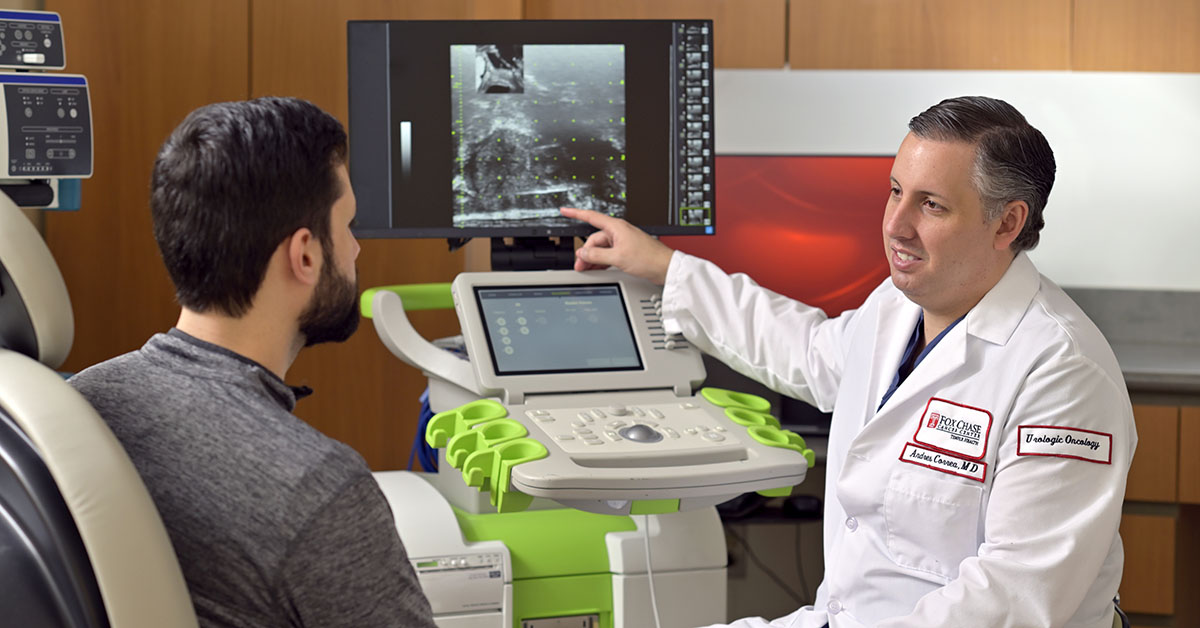
What Everyone Should Know About Prostate-Specific Antigen (PSA) Levels
-
Screening for prostate cancer often involves a prostate-specific antigen (PSA) test, which measures the level of PSA (a protein made by the prostate) in the blood. When your PSA level is elevated, it could be a sign of prostate cancer.
Because of this, an elevated PSA level may warrant a biopsy of the prostate, but according to Andres Correa, MD, a urological oncologist at Fox Chase Cancer Center, this isn’t always the case.
“There are a lot of reasons for an elevated PSA level, and cancer is only one of them,” Correa said. “For instance, it may be due to an enlarged prostate, prostate inflammation or an infection.”
When to See a Urologist
According to Correa, the most important thing men should know about PSA testing is that they need a baseline test when they’re in their 50s. Knowing your individual PSA value early on allows your urologist to personalize your screening recommendations and follow any PSA elevation you experience with better accuracy.
“And if you’re African American or have a family history of prostate cancer, you should start getting PSA tests at age 45,” he said.
If your PSA starts rising persistently, a urologist will look at the big picture of your health to determine if there is cause for concern. They will ask about urinary symptoms, other symptoms related to prostate inflammation, and other factors that can impact PSA (including exercise).
“If your exercise routine includes a lot of perineal pressure, especially before a PSA test, you are more likely to show a false elevation,” Correa said.
Next Steps
If your urologist thinks you might have prostate cancer, there are three diagnostic options they may recommend:
- Biopsy: During this procedure, a probe is placed in the rectum and samples are taken to be examined under a microscope. This test is the most definitive way to diagnose prostate cancer. There are some risks, however, including a chance of bleeding and infection.
- MRI: This imaging test looks for lesions in the prostate and helps your care team identify areas that might need to be biopsied. It can also help determine if a biopsy is even needed and saves many men from unnecessary biopsies.
- High-resolution micro-ultrasound: This new technology merges the capabilities of an MRI and a transrectal probe into a single device. It also provides same-day results. During this outpatient test, a probe is placed in the rectum and allows the urologist to see the architecture of the prostate. This enables them to identify any concerning lesions and, if needed, take targeted biopsies. This technology will soon be available at Fox Chase Cancer Center, and we will be the only medical center in the Philadelphia region offering it to patients.
Additional Advice
Having a baseline of what’s normal for you can help doctors identify possible problems in the future, so regular PSA testing later in adulthood is key.
Knowing your risk is incredibly important, too. A family history of prostate cancer—or breast or ovarian cancer—puts you at an increased risk of developing prostate cancer.
Also, don’t be afraid to reach out to a urologist for advice. Now, it’s easier than ever before to do that at Fox Chase.
“With our telehealth initiative, a lot of patients don’t even have to leave their house for us to provide guidance,” Correa said. “In reality, a majority of the elevated PSA cases we see can be explained by something other than prostate cancer. However, we don’t know that for sure and can’t give patients peace of mind until we meet with them.”
Learn more about prostate cancer diagnosis at Fox Chase Cancer Center
